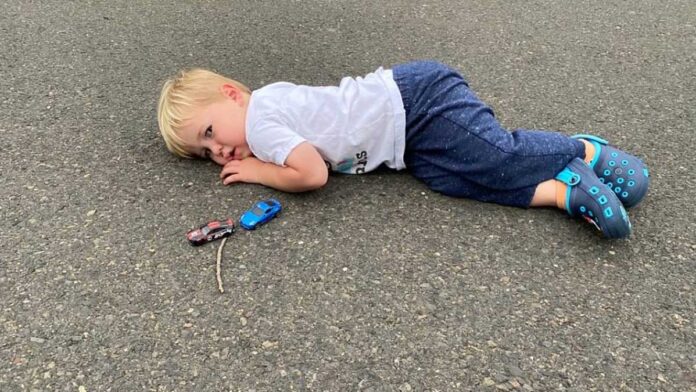Nearly two-and-a-half years ago, I wrote a column for PGN about how Ashlee and I were “riding the emotional roller coaster” of the first trimester of pregnancy — both the nerves about this new adventure and my humorous frustrations with Ashlee’s hormonally-driven ups and downs. I included a sampling of my “Things that Make Ashlee Cry” list, and as karma would have it, that good-natured joking is now coming back on me in spades as Jackson has entered the dreaded “Terrible Twos.”
Below is a sampling of my “Things that Make Jackson Cry” list: his hot dog broke, his Nutri-Grain bar broke, he got a boo-boo (he did not have a boo-boo), his ice melted, the wind blew his hair, the sun was out, the dog walked past him.
When I say “cry,” I don’t mean a few tears and a scrunched-up, pouty face. I mean full-blown, ear-splitting screaming, banging his head on the floor, rolling from one side of the living room to the other, hurling any object he can find into the air, hyperventilating, and red-faced inconsolable crying. Last week, he was so distraught that I wouldn’t let him bring tiny ice shards from our refrigerator ice-maker on our walk that he treated the neighborhood to a violent, 40-minute tantrum that involved him knocking his tricycle over and pieces scattering all over the street, laying immovable in the middle of the road and kicking me square in the head. The Terrible Twos have certainly arrived with a vengeance.
I can’t say I blame Jackson. There are many days (most, lately!) when I want to throw myself on the ground and scream. Being two years old, he has no concept of how to properly handle emotions. He’s living in a world where all of his decisions are made for him and he has almost no autonomy. He’s blazing smart but he doesn’t understand the “why” behind so much that happens to him throughout the day. That’s got to be frustrating. I try to remind myself of that when he’s spiraling to keep myself from breaking down alongside him.
There are also a few other techniques Ashlee and I have found can work (though, as most parents will attest, sometimes no amount of patience, reasoning or bribery can bring a 2-year-old in the midst of a meltdown back from the brink).
Bargaining: Jackson’s thankfully getting to the age where he’s starting to grasp “if” statements. “If you eat that last chicken nugget, you get a cookie. If you hit the dog, you go in time out.” That’s not to say that using either rewards or punishments can make a tantruming toddler see logic, but I have found that tempting Jackson with books, toy time or going for a walk — and talking about them excitedly — as conditions of his calming down do sometimes give him enough pause that I can quick run with that line of thinking to distract him from whatever atrocity initially set him off.

Options: Jackson went through a phase recently where he lost his mind whenever a piece of his food broke (see above!). He would scream “big!” and lament that whatever dish it was was no longer fully intact (this held true for after he took a few bites as well). After a few meals like this, I started trying to head off trouble by reminding him at the onset of that eventuality, and giving him the option of whether he wanted his food “big” or in pieces to start with. We’ve since extended that idea to other areas: What color shirt do you want to wear today? (The answer is always blue.) Do you want to turn left or right? Would you rather pizza or fish sticks? These are tiny decisions that don’t mean anything to us as parents but to him are significant. And it’s helping us build the foundation for some important lessons: if he asks for his Nutri-Grain bar in pieces and then screams “big!” when he gets it, we get to explain the value of decisions and consequences (though that’s usually drowned out by screaming).
Lots of Love: I recently read a blog from a mother who talked about the “heartbeat hug” — when an adult wraps an emotionally wrought toddler against their chest so the little one can hear their heartbeat. Apparently, studies have shown that has a physiological impact on kids’ systems, helping them to calm their breathing and their temper. I tried it the other day and … let’s just say, Jackson wasn’t quite into it! We’ll keep trying, as I do see the payoff of positivity. While harnessing patience in the midst of a screamfest isn’t easy, projecting calm can have a reverberating effect. Reciting a chorus of “I know, it must be hard” and “I’m sorry you’re upset” and “It’s OK, I’m here,” while rubbing Jackson’s back may not immediately stem the tears, but I think it starts to reinforce for a distraught little one that their parent will always be there for them — no matter how ridiculous they act!
Disengage: Like in life, sometimes the best way to solve a problem is just to walk away, and I’ve had to do that many a time when Jackson throws a fit. As someone who enjoys problem-solving, it grinds my gears when I can’t calm down my kid no matter how hard I try. As the frustration builds, so does my blood pressure and my own emotions, which only inflame the situation. At times I’ve told Jackson to just let it out and I’ve gone and done dishes or sat out back for a few minutes, or even just stayed with him and done other things in an effort to illustrate that his boundary-testing behavior wasn’t going to get the rise and attention that he craves. Disengaging is definitely one of the hardest strategies.
Pick Your Battles: Recently on a walk, Jackson — hot, overtired and ready for his nap — threw his two cars on the ground and refused to pick them up, instead directing my hand to the ground and saying “Get it.” I told him to get them himself, counted to three to prompt him, put him in a time out on the curb and started pretending I was going to walk away more times than I can count. He wouldn’t budge and the tears started flowing. As much as I wanted to battle it out with him, I knew he needed a nap and I needed to work, so, after a solid 10 minutes of this, I finally just yelled “Fine!” grabbed the cars, picked him up and marched home. As parents, I think we often feel pressured to get discipline right every single time; after all, we’re tasked with laying the groundwork for how our children will behave, react, and process emotions later in life. That’s a pretty tall order. As a white boy growing up in the suburbs, Jackson’s going to move through life with considerable privilege, so whenever he acts bratty, I automatically worry that giving in will allow ideas of entitlement to grow; with a bit of logic, however, I know that my sanity is just as important for both of us as teaching a life lesson in the moment. And I know that, most likely, this 2-year-old isn’t going to remember that one time I gave in and picked up his cars, but he may remember an all-out screaming match with his nerve-frayed mother in the street.
A lot of the frustration I feel when Jackson acts up isn’t because of his actual behavior — though toddler screaming is a special circle of hell — but rather because I don’t know how to control it and worry I’ll do the wrong thing, which I think many parents would agree with. However, like all aspects of parenting, I think if you strive to act out of love, not impatience, anger or frustration, that’s what matters most. Walking away out of self-preservation is an eventual means of showing your child you love them, just as is sitting next to them and riding out the tantrum with them. As long as you come from a place of compassion — despite the tears — your kid may thank you. And until then, there’s always wine.
